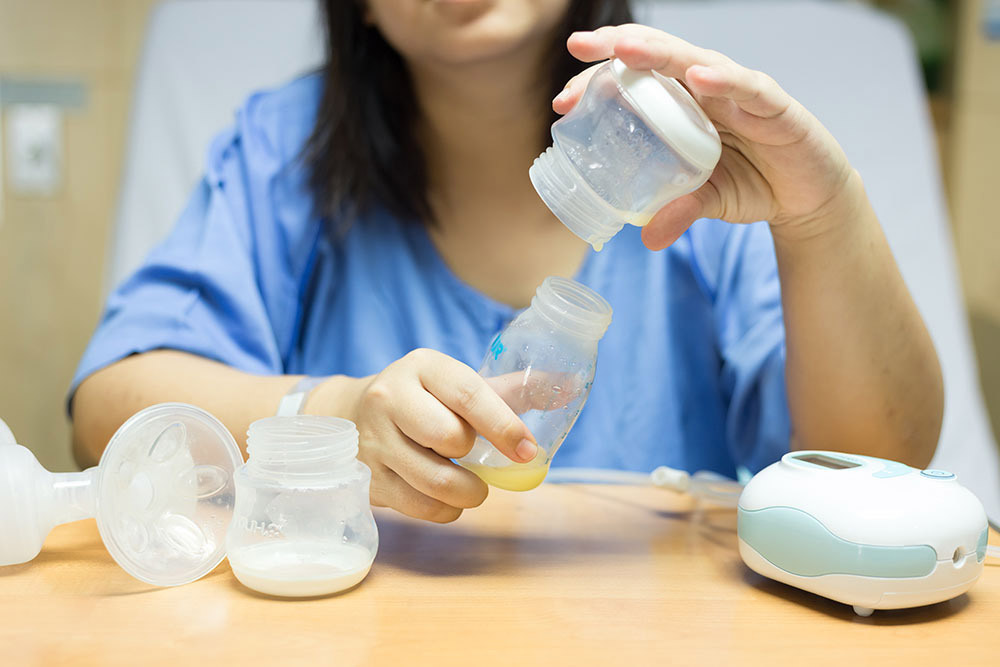Studies Confirm Women Pass on COVID-19 Antibodies to Breastfed Babies

There’s new data to support that breastfed infants are receiving immunity from their mothers. Here’s the latest on what we know.
This just in: Breast milk really is the MVP. A recent study published in the journal Obstetrics & Gynecology has found evidence that breastfeeding mothers vaccinated against COVID-19 are successfully transferring SARS-CoV-2 antibodies to their infants.
Researchers detected antibodies in both breast milk and the stools of breastfed babies. To collect these findings, 30 lactating women from all over the U.S. were enrolled to participate. They provided breast milk samples prior to vaccination and then following both individual doses; 21 days after the mothers’ second vaccine dose, their infants’ stool samples were obtained and measured for immune response.
According to the study, the samples were tested for both receptor-binding domain (RBD)-specific immunoglobulin IgA and IgB antibodies. The breast milk samples reflected that anti-RBD IgB antibodies neutralized the protein spike of the SARS-CoV-2 virus, as well as four other variants! This is encouraging news for parents hoping to provide passive immunity to their newborns and young children. It also serves as an even greater incentive to not only get vaccinated, but also to continue to breastfeed.
Another study from JAMA Pediatrics found that both mothers with disease-acquired immunity (those who contracted COVID and recovered) as well as mRNA vaccination-acquired immunity produced breast milk containing functional SARS-CoV-2 antibodies that fight the virus. While it appears that both types of immunity help provide protection through breast milk, immunization results in different types of antibodies than that of infection, so it’s still best practice to get vaccinated and boosted.
But how long are these antibodies effective? “Information from vaccine studies shows us that antibody levels start to decline after 90 days,” says Jenelle Ferry, MD, neonatologist and director of feeding, nutrition and infant development at Pediatrix Neonatology in Florida. “This is consistent with the findings in the study, where antibody levels in milk also decline. Other studies have suggested antibodies after infection present in milk up to 6-10 months later, but we don’t have this same data for vaccines.”
Regardless of whether or not antibodies have an expiration date, it’s clear they make mom’s milk an even more important tool in preventing infants from getting sick. “Remember that declining [antibodies] does not mean zero, and even some antibodies can infer some level of protection,” explains Ferry. “Most natural antibodies in mother’s milk are significantly decreased by six months after delivery, but there is also evidence that infants who breastfeed for a full year are still receiving immune benefits.”
The bottom line: Any and all breast milk—including supplementation with formula—will have powerful fighting antibodies, and the more your wee one receives—and the longer she continues to receive it—the more antibodies will be delivered to her system.
The same can be said for pumped milk, though extreme temperatures can impact immunity effectiveness; freezing breast milk decreases some immune properties, while exposure to high heat can destroy both antibodies as well as other immune factors. However, moms reliant on donor milk needn’t be discouraged, as data supports that even milk exposed to pasteurization (the process used for donor milk) can maintain neutralizing abilities of antibodies, according to Ferry.
What’s more, the JAMA Pediatrics study also concluded that mRNA was not detected in the breast milk samples, continuing to indicate that COVID infection is not being passed to newborns from mom. So, be reassured that the science is on your side and that you’re only giving baby the good stuff.
While the findings from both studies are promising, Ferry points out that the best thing a mom can do for her infant and his vulnerable, developing immune system is provide human milk that is as fresh as possible; it not only fights off coronavirus, but a host of other infections as well. Parents and caregivers should also take precautions to stay well and avoid getting sick themselves, which will in turn help protect infants.







